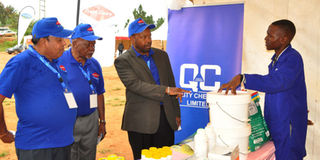Dairy farmers get empowered

Fresh Dairy director of milk procurement and manufacturing John Gethi (R) tours a veterinary drugs supplier’s stand at a past farmer field day in Sembabule District. PHOTO by Shabibah Nakirigya.
What you need to know:
During the field day, farmers were taught ways of sustaining milk production across the year through investment in climate resilient practices such as fodder conservation, writes Shabibah Nakirigya.
Every morning, a vehicle carrying milk cans drives into the villages of Nakaseke District where small-scale farmers sell their milk, and the sale recorded depending on the litres of raw milk delivered.
By mid-morning, the transport vehicle, with the cans full of warm raw milk arrives at Ngoma Bulk Collection Centre, operated by milk processor Fresh Dairy.
As the milk is offloaded into the cooling facility, scores of farmers move patiently in a queue to collect agro-veterinary inputs at a store operated by Fresh Dairy near the milk cooling plant.
Farmers in buoyant mood
Farmers in Ngoma, and other parts of Nakaseke District, are relishing the growth of milk volumes following a partnership with the processor, which emphasises empowerment of smallholder dairy farmers in the area.
“In the past, our milk would be collected by hawkers who, due to the volatility of the informal market, could not assure us of regular payment for supplies sold to them,” Esther Namboozo, a dairy farmer in Kimotozi village in the district, said.
“With regular training on better dairy farming methods, my average production per cow per day has risen from three litres last year to the current seven litres and I intend to further improve this production in all my five cows,” she said.
This week, Namboozo was among the more than 700 smallholder farmers who converged at Ngoma for a capacity building field day organised by Fresh Dairy.
Collection centres
The processor, which is the main buyer of farmers’ milk in the area, has put up collection centres at Kijumba, Kimotozi, Kirinju and Kyabigulu as it seeks to provide farmers with a guaranteed market for their milk.
During the field day, farmers were taught ways of sustaining milk production across the year through investment in climate resilient practices such as fodder conservation. Demonstrations on clean milk production, a key aspect of milk quality, also took centre stage during the field day.
John Gethi, Fresh Dairy’s director of milk procurement and manufacturing said the processor had renovated existing milk collection infrastructure in Nakaseke District and called on farmers to increase production.
“Last year, dairy farmers in Uganda earned Shs70b for milk deliveries made to us, signalling the growing importance of the milk value chain to the economy,” Gethi said.
“Our farmers are, more than ever, focused on ways of growing milk volumes. We have set up a service store near our bulk collection centres to enable them access farm inputs such as veterinary medicines, pasture seeds and artificial insemination services,” he added.
Animal feeds
He called for the adoption of animal feed conservation as a way of mitigating the effects of drought on milk production in the country.
He said conservation of quality hay would ensure that adequate supply of animal feed is maintained even in periods of depressed rainfall.
“One of the effects of drought that hits the dairy sector especially in the first quarter of the year is lack of pasture and the drying up of water sources. As result, many farmers especially in the cattle corridor districts lose a number of animals, while production of milk from those that survive drops marginally,” Gethi said.




